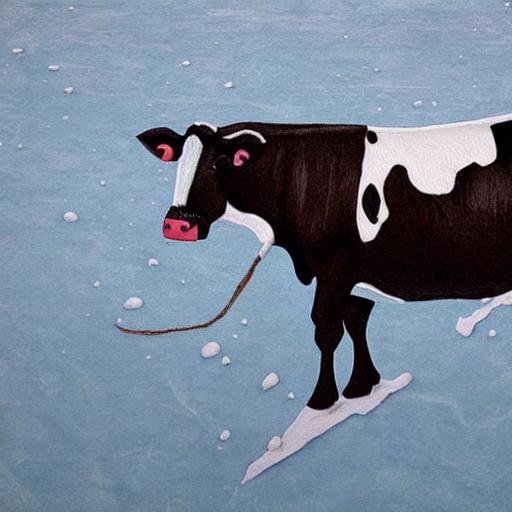Translating Swedish idioms into English is … weird and fun.
As a Swede living and working in New York, I sometimes use Swenglish. Scandinavians might speak English well on average, but we love our native idioms and proverbs.
I often use literal translations of Swedish idioms daily when I speak English. And when I use these literal translations, like “there’s no cow on the ice,” my American friends have no idea what I’m talking about.
They do get a good laugh out of it, though.

Here’s a list of typical Swedish idioms and proverbs — directly translated into English in the way that I would accidentally use them.
Here we go:
Strange Swedish Idioms in English
1. “To take a crap in the blue cupboard.”
What it means: You did it this time — and there will be hell to pay.
2. “To have something land between two chairs.”
What it means: When something gets overlooked because no one is responsible.
3. “There’s a dog buried here.”
What it means: Suspecting that something’s not right.
4. “To make a hen out of a feather.”
What it means: Turning something that shouldn’t be an issue into one.
5. “You look like you sold the butter and then lost the money.”
What it means: When a person looks both sad and a bit guilty at the same time.
6. “Everyone knows the monkey, but the monkey knows no one.”
What it means: While everyone might know who you are because you’re different, it doesn’t mean everyone wants to befriend you.
7. “All ways are good, except for the bad ones.”
What it means: When something succeeds with the use of unconventional methods.
8. “To sense owls in the bog.”
What it means: Something’s not right, and if we’re smart, we could probably figure it out. 1Yes, the owls are not what they seem. Still, the Swedish idiom “I sense owls in the bog” pre-dates Twin Peaks.
9. “To be behind the float.”
What it means: A person that doesn’t come across as very smart.
10. “To carry the dog’s head.”
What it means: When someone has to take the blame for something.
11. “To take off to the forest!”
What it means: Go to hell! (This is strange because all Nordic nations love their forests. Our version might be kinder where we just want to be rid of someone for a while.)
12. “To pull everything over the same comb.”
What it means: To over-extend a generalisation.
13. “To pull one’s nose.”
What it means: To pull one’s leg. I guess we went facial here!
14. “To burn fires for crows.”
What it means: Doing something completely unnecessary.
15. “To get someone for old cheese!”
What it means: Revenge will be mine!
16. “To be born in the vestibule.”
What it means: They are rather stupid.
17. “To slide in on a shrimp sandwich.”
What it means: Sometimes, you don’t have to struggle.
18. “Like a cat around hot porridge.”
What it means: Being restless and slightly nervous until it annoys the people around you.
19. “To have an unplucked goose with someone.”
What it means: Having a score to settle with someone.
20. “To jump into a crazy barrel.”
What it means: Do something completely irrational.
21. “To hold box.”
What it means: Talking so much, no one else gets a chance to talk. “Standing on a box” would have made more sense.
22. “To stay on the carpet.”
What it means: To practise self-restraint.
23. “To get something from the horse’s mouth.”
What it means: Having first-hand information. 2 I’m pretty sure this works in English, too. Still weird..
24. “No danger on the roof.”
What it means: It’s safe even though we thought it wasn’t.
25. “The Interest Club is taking notes.”
What it means: Sarcastically pointing out something is obvious, redundant, or dull.
26. “To throw cash in the lake.”
What it means: Spending unnecessary money.
27. “To cook soup on a nail.”
What it means: Being creative with nothing.
28. “To buy the pig in the sack.”
What it means: Not doing proper research before making a decision.
29. “Now shame walks on dry land.”
What it means: When immorality takes over, you feel you can’t stop it anymore.
30. “It’s the dot over the ‘i’.”
What it means: Adding the final touch.
31. “The thing is beef.”
What it means: When something’s completely done.
32. “To perform magic with the knees.”
What it means: Being creative with no resources — even if it takes some faking.
33. “To be out bicycling.”
What it means: When someone makes out-of-the-blue assumptions that are also wrong.
34. “There’s no cow on the ice.”
What it means: Something might seem hazardous, but it’s okay.
35. “To get caught with the beard in the mailbox.”
What it means: To be caught doing something you shouldn’t do — and you know it.
36. “Don’t cry over spilt milk.”
What it means: What is in the past is in the past. Pick yourself up and move on.
37. “Close shooting, but no hare.”
What it means: Close, but no cigar.
38. “A dear child has many names.”
What it means: Something or someone loved is often called by many names or nicknames.
39. “To blow on cold porridge.”
What it means: To be overly cautious, often unnecessarily.
40. “To paint the devil on the wall.”
What it means: To imagine or anticipate the worst possible outcome, often unnecessarily.
41. “To have pointy ears.”
What it means: To pay close attention, often with an air of suspicion or scepticism.
42. “To have hens to pluck with someone.”
What it means: To have unfinished business or a score to settle with someone.
43. “To have a finger involved in the game.”
What it means: To have an influence or stake in a situation, often secretly.
43. “To make a mountain out of a molehill.”
What it means: To exaggerate a problem or issue, often making it seem more significant than it is.
43. “To throw pearls at swine.”
What it means: To waste valuable resources, time, or effort on someone or something that doesn’t appreciate or deserve it.
Well, I hope that was as good for you as it was for me!
I’m sure many more Swedish idioms deserve a literal English translation. If you know more funny Swedish idioms that belong on this list, please let me know.

THANKS FOR READING.
Need PR help? Hire me here.

Annotations
| 1 | Yes, the owls are not what they seem. Still, the Swedish idiom “I sense owls in the bog” pre-dates Twin Peaks. |
|---|---|
| 2 | I’m pretty sure this works in English, too. Still weird. |


